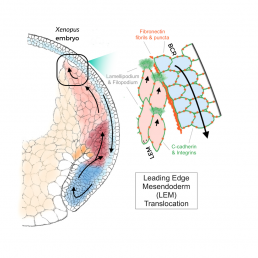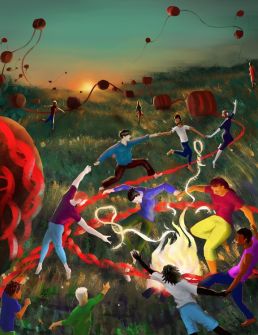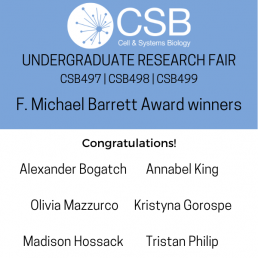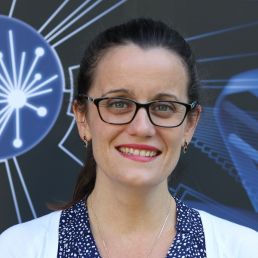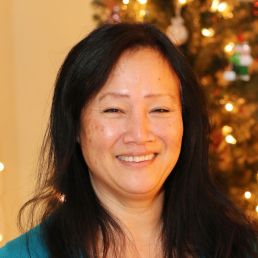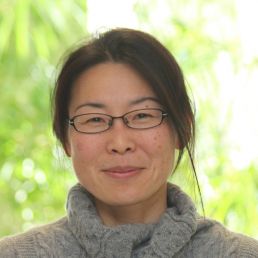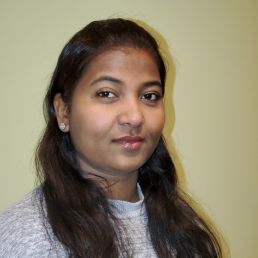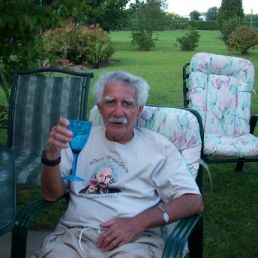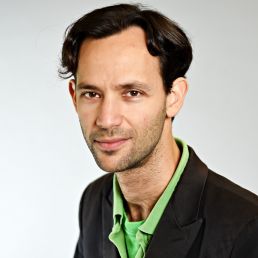Tiptoeing around in the frog embryo
Dr Martina Nagel recently found the answer to a puzzle that she has been pursuing for 30 years in the laboratory of Prof Rudolf Winklbauer. She determined how the sheets of tissue that become the adult frog can migrate past each other while staying mostly separate as the embryo grows and develops into a tadpole. Using a suite of genetic tools she developed over 30 years and a novel X-ray imaging technique developed by Prof Ralf Hofmann of the Karlsruhe Institute of Technology, she could see that the cells in one of the sheets tiptoe over each other, rather than sliding on the surface of the other sheet that was considered the base layer.
This breakthrough was published in the journal Development as “Capillarity and active cell movement at mesendoderm translocation in the Xenopus gastrula”, with supporting contributions from co-authors Debanjan Barua and Dr Erich W Damm in CSB.
Before the Xenopus laevis embryo grows into a tadpole, a process known as gastrulation forms the layers of cells that become organs. As these cells fold over each other, the internal leading edge mesoderm (LEM) must move up under the downward-moving blastocoel roof (BCR).
Nagel is a leading expert in the signals that pass between these two sheets. She, Winklbauer and others have shown that the cues that guide cell movement reside on the BCR surface facing the LEM. Cadherin proteins mediate close cell–cell contacts, whereas adhesive cell contacts over intermediate distance occur through fibronectin (FN)-integrin interaction. The recognition of an FN-bound growth factor (PDGF-A) by its receptor (PDGFR-α) provides cell guidance: LEM cells adjacent to the BCR underlap each other with protrusions that are oriented in the direction of migration toward the pole of the embryo.
This shingle arrangement underlies the process of collective migration of the cells. The frog embryo is not transparent, and migration cannot be directly observed in the light microscope. Hofmann developed the imaging techniques exploited in the paper by using a third generation synchrotron beam. High energy emissions (30 keV) allow X-Ray tomography of opaque living embryos at the subcellular level, while also providing a wider field of view than conventional fMRI. Even though they can delicately tune the beam to keep the embryo alive, the team was limited to scanning embryos every 10 minutes, as more frequent images would cook the egg.
Collaborating with Hofmann, Nagel observed LEM cells detaching regularly from the external BCR base layer. Techniques that modulate the forms of PDGF and the levels of FN and cadherin demonstrated that these cells nevertheless depend on proximity to the BCR for guidance.
Nagel comments that “Rudi is always trying to bring his physics into my biology”, and indeed, Winklbauer calculated stress and pressure patterns due to active cell movement at the LEM wedge. These equations show that the shingle arrangement of cells in this liquid-like tissue produces a mechanical effect that ensures proximity of the LEM to the BCR without the need for direct, permanent contact except at the LEM tip. The tip cell-BCR contact mediates mechanical interactions that can be characterized in a force diagram that successfully modeled the observed movement, providing further support for Nagel’s conclusion.
Nagel’s very first paper demonstrated the shingle arrangement of the LEM using electron microscopy and cell culture. She is very happy that, after 30 years, her new paper finally shows the purpose of this arrangement in living embryos. Altogether, these results demonstrate that, to move across the BCR the shingled cells of the LEM crawl over each other instead of on the BCR itself, using an elaborate mechanism to hover over the BCR base layer and to collect directional information while only rarely touching the BCR.
Many thanks to Yunyun Huang of the Winklbauer lab for the accompanying explanatory diagram.
Transcriptional enhancers don’t require ‘master regulators’
A common assumption in studying gene transcription is that there are 'master regulators' that are required for gene regulation. Gurdeep Singh from Professor Jennifer Mitchell’s laboratory challenges this view in the latest Genome Research by showing that gene transcription can be precisely regulated by a diverse suite of factors, without any specific master regulators. This is a significant new insight into a major challenge of the post‐genomic era: determining the ‘cis‐regulatory code’ that relates DNA sequences to gene expression in a specific cell type.
Singh’s evolutionary analysis used machine learning to reveal conserved high enhancer feature (CHEF) regions containing a diverse array of transcription factor binding sites (TFBS). Active stem cell enhancers are found to contain over 10 TFBS out of a repertoire of 70 different TFBS.
Previous studies concatenated multiple master regulatory sequences, but were unable to reach the output level of natural enhancers. Synthetic CHEF enhancers with multiple TFBS drove expression in mouse embryonic stem cells with at a level much greater than synthetic enhancers containing repeated ‘master’ regulator TFBS (Sox2/Oct4). This is the first demonstration of the necessary and sufficient determinants of a cis‐regulatory code.
The artwork from Ian Hsu of the Moses lab commissioned for this study shows a diverse group of people, representing diverse transcription factors dancing on enhancer DNA. You can read more about this research in ”A flexible repertoire of transcription factor binding sites and a diversity threshold determines enhancer activity in embryonic stem cells”.
Exceptional Science at the CSB Undergraduate Research Fair
On April 9th, students in CSB497, CSB498 and CSB499 presented the results of their year-long research programs in a virtual talk. Presenters were divided into three breakout rooms for their presentations. Our graduate student volunteers did an excellent job chairing and running the concurrent sessions
Undergraduate Chair Prof Dinesh Christendat felt that this year "We had an impressive number of attendees at each of our concurrent sessions. The quality of the presentations and the discussions were excellent."
Every year, the F. Michael Barrett Award is given based on who best presented their research and clearly demonstrated their knowledge in response to the judges' questions. The winners for the 2020-21 CSB Undergraduate Research Fair are: Alexander Bogatch (Plotnikov lab), Madison Hossack (Yip lab), Olivia Mazzurco (Desveaux lab), Annabel King (Ringuette lab), Kristyna Gorospe (Yoshioka lab) and Tristan Philip (Christendat lab).
Congratulations to all of the students for a job well done and a special congratulations to the award winners. Thank you to our administrative staff, Janet Mannone, Melissa Casco and Nalini Dominique-Guyah who were very active behind the scenes to ensure a successful fair.
The research topics for each student were:
Alexander Bogatch: Challenging the dogma: Regulation of cell migration by calcium signaling
Madison Hossack: A Detailed Analysis of Genetic Mutations in COPA Syndrome
Olivia Mazzurco: Diversification of effector-triggered immunity in the Brassicaceae family
Annabel King: The role of SPARC in regulating lipogenesis in the Drosophila fat body
Kristyna Gorospe: Investigating the effect of phosphorylation on TTM1 protein degradation via the 26S proteasome system
Tristan Philip: The shikimate pathway enzyme DAHPS is allosterically regulated by phenylalanine in the ancient land plant Marchantia polymorpha
Lifelong learner Monica Mc Sheim on mastering complex organizations
Monica Mc Sheim is fascinated by the interaction of social structures and individual roles in society, and by adaptations that have challenged traditional structures. She pursued this passion studying Sociology at Wilfrid Laurier University, with minors in Anthropology and Women’s Studies. Her jobs in corporate finance, independent school administration and University administration have built her extensive knowledge of the many moving parts in complex organizations.
Mc Sheim is Executive Assistant to the Chair of CSB, planning and facilitating administrative procedures, such as those related to career progression of faculty, as well as interpretation and implementation of Departmental and University policies. This work requires a high level of multi-tasking and organization, and can effect change through understanding the goals and motives of stakeholders. Mc Sheim says on an individual level her effectiveness has been enhanced by the courses she pursued in her studies.
In light of International Women’s Day, Mc Sheim notes that earlier in her career when her children were born, she had to make decisions to postpone pursuing advancement in order to balance family responsibilities, that male colleagues likely would not have to consider. Having worked in traditionally female-dominated occupations, she is inspired by seeing increasing examples of women in leadership positions.
As a lifelong learner, McSheim advises, “Take every opportunity for professional development in topics that give you fulfillment and in areas that you think you may be interested in. Doing so might develop a skill, interest or network that can open a door to an opportunity that you may not have previously considered.”
Initially McSheim would take individual courses, but formalized this path upon learning that U of T would support her to pursue a Masters in Higher Education at OISE. She is halfway through her studies, which are contributing to her breadth and depth of knowledge in systems of higher education and student support. As a first-generation university student, Mc Sheim is proud of her accomplishments and strives to use her knowledge and skills to contribute to positive changes.
In her spare time, Mc Sheim enjoys the outdoors and keeping active with her family. She looks forward to the end of pandemic-related restrictions and a return to taking regular hikes and camping.
Dr Pauline Wang finds fun in tackling analysis of complex samples
Dr Pauline Wang is Facility Manager of the Centre for Analysis of Genome Evolution & Function (CAGEF). Her facility provides research services to scientists around the world in comparative, evolutionary, and functional analyses of genomes and proteomes.
Inspired by a young woman who taught her biology in Grade 6, Wang chose to pursue a career in science, with a Bachelor’s degree at Rensselaer PI in New York. Near the end of third year, experience in research showed her that a PhD would be the most fulfilling course for her, rather than the MD sought by her classmates.
With a PhD and postdoctoral fellowship at SUNY Stony Brook and a second postdoc in Chicago, she immigrated to Canada and, after a break to have her third child, became a Research Associate in CSB Professor David Guttman’s lab. As Professor Guttman built the facilities that would become CAGEF, Wang took on the training and management of students and staff. She now directs a team at CAGEF and the Guttman lab of over 20 Technicians, Project Managers, postdocs and students.
Wang sees great importance in supporting women and underrepresented minorities in science. Young women often express concern to Wang about whether it is possible to do research and have a family. From her own experience, Wang reassures them that it can be done, but the key is time management. Whenever Wang had to get to childcare by the end of day, she made sure to plan her experiments to finish on time for pick-up.
Even though managing staff and client contact is a big part of her job, Wang says that at heart she is a bench scientist and loves doing experiments. Her team can assay anything from the smallest metabolite through protein complexes to the multiple genomes in a microbiome. With many clients of CAGEF asking to process unusual species or samples, she loves to develop and troubleshoot new methods for these projects.
Remembering her Grade 6 inspiration, Wang is conscious of the importance of a good teacher. She brings excellence to designing and delivering genome biology workshops on processing and analyzing genomic samples. At CAGEF, one of her most fulfilling experiences was training scientists from Africa to improve coconut blight control through a collaboration with Professor Keiko Yoshioka.
Professor Keiko Yoshioka goes with optimism to a career in plant science
Professor Keiko Yoshioka recalls the joy of running through fields of grass that were as tall as her near her childhood home in Osaka, Japan. As a young student, she learned the role of agricultural innovation in avoiding worldwide food shortages. Curiosity about the verdant growth around her led to agricultural studies at Hokkaido University. She feels her success depends in great part on the power of education, particularly the innovative instruction she received at her University-supported middle school.
However, Yoshioka and her classmates suddenly confronted a lack of job opportunities for educated women upon graduating with their BSc. Although she proceeded to earn a PhD and a post-doctoral role at the prestigious RIKEN institute, Yoshioka felt that there would be no opportunity to gain a professorship in Japan.
At the time, Yoshioka had a minimal grasp of English, but her inherent drive to “go with optimism!” led her to post-doctoral jobs at the Waksman Institute in New Jersey and the Boyce Thompson Institute at Cornell University. She knew to become a professor she had to set the goal of publishing discoveries at the top of her field. Although she was not afraid to fail and move to another job, her discoveries yielded several top publications on plant-pathogen interactions.
Yoshioka says that many students see a professorship as the goal of a successful career. As a Professor, Yoshioka advises them that she defines success as happiness at what you do. “Take the time in your 20s to figure out what you want so you are never in a position to regret a MSc, PhD or postdoc.”
Yoshioka’s search for her desired professorship landed her a position at U of T to continue her studies of plant-pathogen interactions. She has come to love Canada, and this city whose broad and deep scientific opportunities also support her partner. Initially, her lab and her department’s focus was on the molecules inside plant cells, but she gradually started applying her knowledge of what was happening within the cell to effects on crop plants in the real world.
One of Yoshioka’s most cherished projects is a collaboration regarding the devastating coconut blight disease in West-Africa. Researchers from Africa came to Toronto for training in molecular biology to characterize and combat coconut pathogens. Yoshioka is happy that this initiative also improved the lives of the farmers, primarily women, who depend on their coconut crop. Furthermore, this project led to her most recent research endeavor, the immunization of plants via beneficial soil microorganisms.
Dr Sakthi Moorthy chasing the dream to be a scientist from India to Canada
For International Women’s Day 2021, Cell & Systems Biology (CSB) is highlighting the scientists behind the science we publish, and the staff that support them.
Dr Sakthi Moorthy has been a valued member of the Mitchell Laboratory in CSB, and we would like to congratulate her on her new position as Development Scientist at the Centre for Commercialization of Regenerative Medicine (CCRM).
Even as a child, Moorthy’s scientific inclinations led her to collect and categorize leaves to better classify the variety of plants near her home in Chennai, India. Her strong intellect also means she covets the challenge of competing to win at chess. Although her parents would have been content to see her happily married, Moorthy impressed them by avidly pursuing science at school and fighting for excellence in all subjects. In high school and university, she pursued a passion for molecular biology.
Moorthy’s strongest motivation was to bring the benefits of research discoveries to patients, so she pursued a Masters and PhD in Biotechnology. Work placements during her studies put her in a position to study vaccine production at industrial facilities. Moorthy says her greatest achievement was successfully competing for prestigious Research Fellowships from India’s ICMR and CSIR to continue her studies of infectious disease treatment.
Moorthy moved to Canada with her 6 month old baby for better research opportunities, and began seeking a suitable position when her child was 2 ½ years old. With no recent experience or knowledge of Canadian research culture, she found it hard to step back in to find a job to prove her worth. Her drive and her skills in molecular biology and cell culture led her to a technician job in Prof Jennifer Mitchell’s laboratory in CSB.
Bringing her customary technical precision, she impressed Mitchell with contributions to a groundbreaking paper using the new CRISPR technology. Intrigued by unsolved puzzles in the paper, she developed a research project to study the genetic factors that drive mouse embryonic stem cells to become neural stem cells. She wrote or contributed to seven publications from the Mitchell laboratory, all while training students and managing lab facilities.
Her strong publications and skills with gene editing and cell culture led to her current position at CCRM. Working with startups to make hypoimmunogenic cell therapies that comply with regulatory requirements puts her at the leading edge of the biotechnology industry. She is impressed to see that women in her facility will spend long hours running the bioreactors, in contrast to the vaccine facilities of her youth, where only men were considered suitable for the physical requirements of keeping the bioreactors running.
With CCRM’s goal of transitioning discoveries from benchside to bedside, Moorthy is fulfilling her wish to bring direct benefits to patients from fundamental discoveries.
In Memoriam: Professor Stephen Tobe leaves legacy through mentorship and research in arthropod endocrinology
We are sad to share news of the passing of Professor Emeritus Stephen Tobe. He was a world traveller and world-renowned researcher in arthropod endocrinology, specifically the regulation of juvenile hormone biosynthesis by microRNAs and neuropeptides called allatostatins.
CSB's own Professor Chris Garside earned his PhD in Tobe's lab and relates that "He was an inspiration to me as a scientist. He was my mentor; and he encouraged me to look beyond the surface and to ask the question why? He was paradoxical – both intimidatingly brilliant, and yet approachable. I always loved discussing life over beers at the Madison Avenue Pub, his office away from the University."
In Tobe's lab on the fifth floor of the Ramsay Wright Zoological Laboratories, he primarily studied the endocrinology of cockroaches. He branched into other insects like caterpillars, locusts, fruit flies as well as crustaceans like red crabs, due to the way endocrine biosynthetic pathways diverge between these arthropods. "He gave me and many students an opportunity and the freedom to pursue what we were interested in discovering in the lab. He allowed us to make mistakes…but [taught] that we must learn from those mistakes," recalls Garside.
A prolific scientist, Tobe continued to publish into 2020 with collaborators in Hong Kong, close to the property he shared in Thailand with his wife Martha, who survives him.
You can read more about Stephen and leave a tribute through this link to his obituary.
Alan Moses decodes and remodulates proteins to earn Canada Research Chair
Professor Alan Moses of Cell & Systems Biology is at the forefront of data science in cracking the lingering mysteries underlying the function of protein molecules. He has been renewed for his position as Canada Research Chair (CRC), recognizing that he will be leading further advances in his field.
The Moses laboratory is working to decrypt the pattern behind the enigmatic “intrinsically disordered” regions (IDR) within proteins. The shape of many protein molecules is known, even down to the coils and sheets of individual regions. However, IDR resist structural analysis and prediction as they contain no set sequence of amino acids. IDR are widespread and, when mutated, can be involved in human disease.
Moses’ lab makes testable predictions about the function of residues within IDR by examining the overall qualities retained by these regions during evolution. In systems biology experiments that validate these predictions, they study the role of IDR in transduction of signals from outside the cell to the genes inside the nucleus of the cell. This has led to development of further predictive models examining modulation of signal transduction in the cell.
Moses’ quantitative cell biology initiatives have produced high-throughput, automated image analysis tools for microscopy. These tools address the issue that knowing the function of proteins is important, but where the proteins are found in the cell will determine whether they can accomplish their role. Moses’ lab produces artificial intelligence models that autonomously learn about protein biology from image analysis; the model can directly predict where many different proteins will be found within the same cell.
Moses has been a dedicated supervisor to his graduate students and promotes engagement in his laboratory by undergraduate students. His commitment to academic openness is evident on his website, where he shares his databases and tools with the community. Alan Moses exemplifies our dedication to both Cell Biology and Systems Biology.
Congratulations, Alan!
CSB Graduate Students gather online to raise funds for the Christmas Wish Toy Drive
Graduate students at Cell & Systems Biology have spent this challenging year working from home since March and taking distanced shifts in the lab since July. On December 11th, they gathered online to see each other, to spread some holiday cheer and to raise money through the CSBGU Raffle. They raised a total of $880.00 for the CHUM FM Christmas Wish Toy Drive. Masters candidate Shanelle Mullany drew the names for prizes including an espresso maker, a donated Thermo-Fisher gift basket, a chocolate gift basket donated by Wisent Bioproducts and 2 donated subscriptions to Biorender. Gift cards were also donated by Starbucks, Subway, Baskin Robbins, and Tim Hortons. The CSBGU feels that "We are glad to have the opportunity to give back after such a trying year. Happy Holidays!"
CSB staff and faculty normally gather with the graduate students to celebrate the holiday, but this year the Department declined the holiday party and doubled the money raised by the CSBGU to donate $1760 to the Daily Bread Food Bank . "There's a lot of need this year," said CSB Chair Nick Provart in commending the fundraising efforts of the students.

